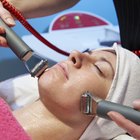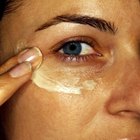
studiokovac/iStock/Getty Images
As you age, you may notice the skin on your neck beginning to thin. Your neckline may become less pronounced and your skin may begin to sag and develop lines and wrinkles. While you cannot completely prevent the aging process, taking proper care of your skin throughout your life can minimize the appearance of thinning skin and other signs of aging.
Effects
Thin skin on the neck begins to lose its elasticity due to the breaking down of collagen bands below the skin's surface. Sun exposure speeds the aging process and contributes to 90 to 95 percent of the lines, wrinkles and skin discolorations people develop as they age, according to the American Academy of Dermatology. Neck skin that loses its plumpness and elasticity is more prone to developing white lines and indentations due to atrophy.
Home Treatment
While there are not many at-home treatments that will plump your neck skin, you can minimize wrinkles and discoloration that often accompany thin skin with topical products. Moisturizers increase your skin's ability to hold moisture and may help it appear fuller. Choose a gentle, unscented moisturizer and apply it to your neck area daily after cleansing. Creams, gels and lotions that contain topical retinoids or alpha-hydroxy acids can help minimize the appearance of lines and wrinkles in some individuals when applied daily.
Medical/Cosmetic Treatment
Chemical peels, dermabrasion and light therapy cosmetic treatments can help improve your skin's texture and minimize areas of discoloration. Since these techniques remove the top layer of skin, they can also help smooth out fine lines and wrinkles that appear on your neck. If the skin on your neck is sagging due to thinness, facial cosmetic surgery procedures can correct the bands in your neck to give it a firmer, more youthful appearance.
Considerations
In most cases, thinning neck skin does not pose a medical or health threat. While some over-the-counter products and cosmetic procedures can minimize the aesthetic concerns of aging, discuss your options with your dermatologist or doctor. Some people are not good candidates for certain cosmetic procedures due to medical conditions or lifestyle factors, such as smoking. Your dermatologist or doctor may also be able to recommend a product to help you improve your appearance or prescribe a prescription-strength topical cream with a higher concentration of active ingredients than you can purchase without a prescription.
Prevention
Thinning skin is part of the intrinsic aging process that typically begins in the mid-20s, according to the American Academy of Dermatology. Practicing proper skin care early in life can help slow the aging process. Wear sunscreen with an SPF of at least 15 whenever your neck will be exposed to the sun. Avoiding tobacco products helps minimize signs of aging as well. Smoking cigarettes can speed up the aging process, and smokers are more likely to develop deeply wrinkled skin than nonsmokers are, explains the American Academy of Dermatology.
Related Articles

Laser Treatment for Face Wrinkles

Help With Chapped Red Cheeks

The Difference Between Retin A & Renova

What Is a Faradic Facial Treatment?

The Best Facial Moisturizer That Won't ...

How to Prevent Cheek Wrinkles

How to Keep Your Tribal Tattoo Black

How to Tighten Saggy Skin on the Neck & ...

Does Microdermabrasion Work to Remove ...

Different Positions for a Tanning Bed

How to Lighten Birthmarks

How to Get Rid of Cellulite & Spider ...

Women With Facial Hair Shaving Vs. ...

Can the Neck Be Exfoliated?

How to Get Rid of Stomach Freckles

The Best Way to Get a Tan If You Are a ...

How to Even Out Skin Tone Without Makeup

Hyperpigmentation and Shaving

How to Remove Shaving Scars

How to Properly Trim Neck Hair
References
Writer Bio
Amanda Knaebel is a self-professed gadget geek and loves all things tech, both new and old. Amanda has been working as a freelance writer for over 10 years on topics including technology, health, fitness, nutrition, gardening and many more. She has also worked with Fortune 50 tech and financial companies, both in technical support and content production.
Photo Credits
studiokovac/iStock/Getty Images